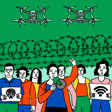Season 3 Introduction: Technology's Regional Impact
00:00:03
Speaker
Welcome to Season 3 of Instant Coffee. I'm Nadine Almanasvi. And I'm Sima Shehab. And this latest season is an exploration of technology and its developments in the region. Beyond the emergence of ChatGPT and Sophia the Robot, we wanted to speak with people who are applying, adapting and reimagining technology in their fields.
Technology, Nationalism, and Warfare in Turkey and Israel
00:00:23
Speaker
We will be exposed to medieval Islamic hospitals, failed Gulf techno-cities, emerging Iraqi fintech startups, inclusive artificial intelligence and much more. In this episode, we explore the link between technology, nationalism and warfare. We talk to researchers who are tracking increased technological warfare in both Turkey and Israel.
00:00:44
Speaker
and how this development works to boost national pride and bolster regimes. We pay particular attention to public perception in this episode, going beyond the technical details of what weapons are used and where, and more on the political and social ramifications.
Corruption and Regime Survival: Didem Soyaltin Kolela's Insight
00:00:58
Speaker
Our first guest, Didem Soyaltin Kolela, is Assistant Professor of Politics and Public Policy at the University of Aberdeen.
00:01:06
Speaker
Her research concentrates on the politics of corruption, mechanisms of state capture and regime survival, autocratic bureaucracies and illiberal governance, with particular reference to Southeast Europe and Turkish politics.
Drone Production and Techno-nationalism in Turkey
00:01:19
Speaker
We were interested in speaking to Didem because of a recent article she co-authored on the regime-boosting effects of drone production in Turkey, so our conversation with her is based around this research. We thought it would first be useful to understand techno-nationalism as it's described in the academic literature,
00:01:35
Speaker
and through them specific analysis in contemporary Turkey. Techno-nationalism, it's hard to define, but it's the recognition that a nation's technological innovation and capabilities are directly linked to its national security, economic prosperity and social stability. So it promotes a national pride in technology as a source of strength abroad.
00:01:57
Speaker
But it also helps governments to mobilize nationalist supporters at all.
The Evolution of Techno-nationalism
00:02:01
Speaker
It's not a new concept though. In 1990s, it was used for countries, mostly global players like United States. And it was, you know, sort of embracing globalization and global diffusion of war technologies.
00:02:14
Speaker
But today, I would say in last two decades, maybe a new form has emerged, more contemporary interpretation of the concept. And it reflects both decline of globalisation and competition between US and rising powers like China, India and middle powers, including Turkey. And how can we understand techno-nationalism in Turkey or in contemporary Turkey today?
00:02:39
Speaker
So it is the mostly just some development party since 2002 led by President Erdogan has embraced, you know,
00:02:47
Speaker
national technologies, you know, how can be developed in defense industries. So I guess in this way, they are trying to instill a sense of national pride and prestige. So at domestic level, it turns into some sort of ability to innovate technology. So in this way, you are also performing legitimacy in front of your constituencies. It's not only happening with global players, it's also happening when it comes to middle powers, including Turkey, but not only Turkey, also Iran in the Middle East.
00:03:16
Speaker
and also India, Saudi Arabia, South Korea, Taiwan in the global scale.
Turkey's Defense Investment and Regional Ambitions
00:03:21
Speaker
So they are also investing in their defense sectors. And in this way, they're also, you know, promoting themselves in front of their voters. In my understanding, rising uncertainty in global politics, also pushing middle powers to, you know, develop their domestic capabilities in war technologies, but also uncertainty or shift in international order, open space for middle powers.
00:03:43
Speaker
to shape emerging regional orders. So at time of this systematic uncertainty, techno-nationalism promotes a stronger sense of national unity and national identity. Maybe it's a bit too strong, but I'm just also citing a recently published report by some colleagues working on Turkey's defence sector. They are also arguing that Turkey is sort of shift from being an importer of war technologies and international client
00:04:10
Speaker
of Western countries into a sort of advanced new developer of drones and sort of an exporter. So I guess this kind of shift appeals to national feelings back home. You know, it brings prestige and people are proud of their governments selling war technologies to many countries in the world now and challenging the global post-power dynamics.
Turkey's Rise as a Defense Tech Exporter
00:04:34
Speaker
But I also want to underline that this is sort of a
00:04:37
Speaker
One part of this ambitious foreign polygen agenda of government is trying to persing in last two decades. Turkey is trying to become a middle power with very strong regional aspirations. So Turkish government also invests in humanitarian projects, especially in MENA region and sub-Saharan Africa. Cultural diplomacy, infrastructure development, actors and mediator individual conflicts.
00:05:01
Speaker
as we saw in Russian war in Ukraine, and Turkish government trying to have a greater voice in international organizations and regional alliances. So I guess, Wambi, if you want to understand how techno-nationalism promotes Turkey's middle power status, we should try to have a deeper understanding how Turkish foreign policy is changing in the last two decades. And what kind of war weapons is Turkey producing at the moment?
00:05:26
Speaker
I guess two promising programs were Turkish aerospace industries ANCA and by Rakhtar drone projects started in 2010. Today, there are new flagship projects. Some of them are ongoing. Some of them are completed or under test, like Altai battle tank, attack helicopter, Khan fighter and Milgem, Miligemi in Turkish. If we translate it is national ship.
00:05:49
Speaker
and some other high-end weapon systems there, I guess, all symbolizing Turkey's growing self-sufficiency in the defense sector and how Turkey want to be self-reliant in foreign and security policies. So I guess it won't be wrong to say Turkey's sort of shifted from being a client in international arm production and trade systems to a competitor. In this case, a bit more, I would say, a collaborator with its homegrown technologies.
00:06:16
Speaker
A couple of numbers may be from Stockholm International Peace Research Institute database in arm transfers. So Turkey's arms imports dropped 55.5% in last decade. And I just checked before coming to this podcast.
00:06:30
Speaker
is 2v2v3, Turkey is the largest 11 arms exporter in the world. So I guess this is quite a huge difference. If you compare in a decade ago, Turkey was not even on the list of top 25. And a big share of export sales come from drones. There are not clear numbers, but I guess $700 million is generally being said, Turkey's government is making from drone sales.
00:06:58
Speaker
to 28 countries in the world, including some NATO allies as well. Wow, that is really a significant jump to being the world's 11th largest exporter. And can you talk to us a bit about the context in which this move from importer to exporter was happening?
Turkey's Shift from Import Reliance to Export Power
00:07:14
Speaker
How were Techu's relationships with other global powers, for example?
00:07:18
Speaker
After some sort of inertia time in 1990s, I guess there was a remarkable step. Turkey initiated some development in the defense sector. Turkish aerospace industries produced a series of unarmed aerial vehicles, some prototypes. And I guess it was sort of the diplomatic tensions happened with Israel in those years because Turkey tried to buy some Heron-type drones from Israel, but there were some diplomatic tensions between two countries.
00:07:46
Speaker
Again, I guess similar things have happening today. There were some deals with the United States, but again there were some technical delays. So this kind of development pushed Turkey to develop its own homegrown technology, especially when it comes to high-end weapons systems.
00:08:01
Speaker
So Turkey is one of the few countries, I guess, in the region where arms imports declined while exports increased. So this doesn't happen very carbon, I guess. So I guess it was, you know, this kind of urge pushed Turkish government to end up in developing its domestic defence capabilities. In 2000, I guess it was during the Erdogan regime or just some development party government's time. We saw significant milestones in development of national defence industry. So we see first indigenious designs.
00:08:31
Speaker
reflecting Turkey's ambition for technological sovereignty. So, Turkish, especially by Rakhtar TB, two drones gained quite a fame. With the Russian invasion of Ukraine, they were quite a game changer. They are quite cheap. I have a couple of numbers. They are, I guess, approximately one-eighth of American manufacturer repo drones, price-wise. They are, you know, quite light. It's easy to use them.
00:08:57
Speaker
So they are affordable and they are readily available. So I guess that makes Turkish drones are quite famous in the world. So they have been integrated into communities of numerous countries in Middle East, North Africa, Central Asia, even in Europe, including Poland, which is a NATO ally and the first country purchasing Turkish drones.
Global Popularity of Turkish Drones
00:09:18
Speaker
But I guess Hungary is also in the queue to buy Turkish drones.
00:09:24
Speaker
So I guess this growing popularity is, you know, making Turkey to contest global power dynamics. And it is also providing an alternative to Western exporters. So Turkey is challenging the dominant discourse when it comes to technological innovation in the world. I remember Erdogan's speech, 2002 and 2001, he said Turkey has risen to world's top three in combat drone technology. And I guess this sort of heralds a slogan, you know, world is bigger than five.
00:09:53
Speaker
you know, a big part of his foreign policy agenda. So you've mentioned the regime boosting effects this weapons oriented part of Turkey's foreign policy agenda is having. And we'll get into the public perception of this shortly, which will be really interesting to hear. But what is this production doing for the economy? Is it stimulating a competitive weapons market or are there issues with cronyism?
00:10:19
Speaker
There are, I mean, very good question. There are a couple of companies, uh, producing drones, but I guess the most important company is Bicartek, producing TB2 by, by Rakhtar drones, which are quite famous around the world now with, you know, different battlefields success in different parts of the world, including Ukraine. And they are produced by Bicartek, a company mastermind minded by Sajuk by Rakhtar. He's the chief technological officer now.
00:10:48
Speaker
And he's also married with Erdogan's daughter. There are obviously some patronage and clianthonistic networks when we look at countries producing war technologies. But I guess there is a competition as well going on. There are others as well, you know, getting some incentives from governments. And they are showing their products in techno-fests in the last couple of years. Some festivals are being organized in different cities, even in heartland Anatolia, but also in big cities, Istanbul, Ankara, Izmir.
00:11:16
Speaker
Marcy and Antalya, they are showing, not only by CarTech, but other companies as well, their products. Not only drones, but other weapons systems as well. And it's turned into a festival with music and concerts as well, appearing to young students, so high schools, especially the science
00:11:33
Speaker
schools are bringing students to these kind of festivals and they are also promoting girls in science and technology education. So it is like it's quite an important difference and I guess a positive development in terms of you know girls empowerment in science technologies. So President Erdogan generally joins these events as well and he is also you know
00:11:54
Speaker
supports this kind of technological innovations. And he also sees that it's a way to have more space in international politics, but also for his regime survival of his party.
Israel's Technological Warfare and Palestinian Impact
00:12:05
Speaker
Regime survival through technology is a concept relevant to the Israeli context too. Along with other countries we've analyzed this season, Israel is another that brands itself and is also branded by others as a startup nation or tech haven. Beyond the corporate tech scene, Israel's military is heavily reliant on technology.
00:12:24
Speaker
Our next guest, Sofia Goodfriend, provides a more granular account of Israel's use of technological warfare and its impact on Palestinians, particularly through her research on the human cost of warfare. We can talk about technological salvation. It's not really unique to Israel. It's something that we see worldwide with many different militaries and many different war contexts. But in Israel, we can trace this idea of technological salvation
00:12:49
Speaker
Back to the early days of Israeli state building, you know, early settlers claims to making the desert bloom with unfounded innovations in irrigation and engineering.
00:12:59
Speaker
And it's important to remember, you know, that desert was emptied of its Palestinian inhabitants through warfare to today's branding of Israel as an innovative startup nation, or today, you know, an AI superpower, where despite unending wars really giving us the IT workforce and the ability to experiment in technologies that will ultimately make the world a better place. And so when I say technological salvation, this is something that a scholar named Jennifer Terry writes about in the context of the United States and militarism.
00:13:29
Speaker
But you can see that kind of playing out here where despite the bloodshed and the ongoing horror of warfare, the technological innovation that comes of it will actually redeem.
00:13:41
Speaker
all of this violence and will actually make the world a better place. So this is really evident, you know, each time that Israel has a bombardment on Gaza where they deploy drones and release a ton of press releases across Israeli media with the general saying, this is the world's first AI war or we've pioneered a new kind of drones form and really distracting from the houses being blasted out and the civilians being killed.
00:14:07
Speaker
and the millions of dollars of worth of destruction, not to mention the human lives, it really distracts from all of that and really pivots, it's an attempt to pivot the world's eye onto, you know, unfounded new technologies that are making warfare more humanitarian and more efficient.
00:14:24
Speaker
So I think whenever we see these headlines, whenever we see these press releases, when each new war happens, it's important to kind of keep in mind how technology is being marshalled in the service of these kinds of claims. And again, to not take the military spokespeople and the press that's regurgitating what they're saying at their word.
00:14:44
Speaker
The conversation we had with Sophia took place before October 7 and Israel's ongoing assault on Gaza. We've included the conversation as it was, without additional comment, as Sophia's analysis remains pertinent to 2024. There will, of course, be moments where facts on the ground may challenge Sophia's commentary, but we believe this is useful in allowing us to work through how real-life events inevitably alter the best of academic theorizing.
00:15:10
Speaker
Thanks for that, Sophia, and for taking the time to talk to us for this episode. Can you tell us more about your research and in what specific ways are you analyzing the role of technological warfare in Israel and Palestine? My PhD research is tracking the human cost of automated warfare in Israel-Palestine, so I really turn to
Surveillance Tech and Soldier Perception in Israel
00:15:30
Speaker
the very discrepant narratives of those bound up in automated warfare. I've spent the past three years researching
00:15:38
Speaker
and speaking with Israeli intelligence veterans and military generals who were instrumental in developing and implementing the technological warfare that we see today. And then I've also spent a lot of time working with digital rights groups across the West Bank, Palestinian lawyers and civilians who are bound up in the everyday effects of automated warfare. And really I use those stories to kind of shed light on another side of the human cost of conflict today.
00:16:08
Speaker
And we've heard in previous episodes about the ways technology is used by Israeli authorities to suppress Palestinian voices, for example, particularly through social media surveillance. But how has technology transformed the Israeli military's interaction with Palestinians? I think that it comes out really saliently when we think about how warfare has changed dramatically in the past 20 years. So a lot of these new technologies are rolled out by the military with the promise that it will reduce the number of Israeli soldiers deployed
00:16:37
Speaker
into combat zones, into Palestinian cities, who are guarding checkpoints, and who come into everyday human interaction with Palestinians, regardless of the context. And on the flip side, you have a new generation of Israeli soldiers coming through intelligence units. And I should say that Israeli intelligence units are increasingly the largest of any unit in the army. Like the elite intelligence unit 8200, which is responsible for
00:17:05
Speaker
developing and deploying a lot of the surveillance technology that I'm talking about has more soldiers than the Israeli Navy. So you have a whole generation of Israeli soldiers coming in and their experience of the occupation takes place, you know, behind a computer screen on an air conditioned base within Israel's boundaries and
00:17:22
Speaker
They do not not and it's I want to be careful here, but it's important not to kind of glorify a past war is like better or more humanitarian. But it does really change how a new generation even thinks about the occupation, even thinks about Palestinians is forced to kind of reckon with the ethical entailments of serving in a military.
Detachment and Ethical Implications in Israeli Youth
00:17:42
Speaker
When a lot of what they're doing comes down to really parsing through civilians data as numbers or looking at people through
00:17:51
Speaker
the lens of a drone flying miles overhead or even just conceiving of individual people just as biometric data. And so I think that when you think about the gamification of war enabled by these technologies, it does have a pretty resounding effect on how a new generation is increasingly cleaved off from the human cost of the occupation for Palestinians and comes to experience a lot of this as just another
00:18:18
Speaker
video game or computer program that they're developing. It really makes the occupation for the Israelis who are called in to serve their mandatory military service easier to sustain. A lot of the veterans who circulate through intelligence units and the units where they're really only interacting with the occupation behind a computer screen
00:18:39
Speaker
see it as maybe a little bit better or more humanitarian than if they were, say, in full military gear guarding a checkpoint or guarding a settlement. And we've seen in the past few decades that this really allows the status quo to drag on. So it allows settlements to increase exponentially across the West Bank. It allows a new generation of Israelis to become more and more right wing as they're increasingly cleaved off from the humanity of Palestinians that Israel is
00:19:09
Speaker
is ruling over via military dictatorship. So I think that it makes warfare for countries on the offensive end, on Israel's end, it makes it much more easier to sustain in the long run because you don't need to mobilize also the political support among a civilian population to send your sons or daughters or brothers and sisters and friends into a warfare where they might risk their lives. It becomes much easier to sustain on that level
00:19:39
Speaker
as well. And I think that globally we see that with unending wars across the Middle East waged by the United States and its allies in Europe as something that's really, really isolated from the population, you know, everyday civilians in the United States and Europe, but has just an enormous and unspeakable cost for civilians who are living in those regions where they live under drone warfare and counterinsurgency every day.
00:20:08
Speaker
And it would be interesting to know what the younger generation of Israelis think about this new and at the moment increased kind of technological warfare, particularly those that are enlisted in the military. The Israelis who circulate through Israeli intelligence units are traditionally seen as
00:20:26
Speaker
part of the elite sector of Israeli society. They're kind of like the same people who would go to Oxford or Cambridge or Harvard or MIT. It's a really coveted kind of technological training. And a lot of people see it as a ticket out of Israel because they don't want to live here forever because of the political situation, especially now. So those people stereotypically are overwhelmingly secular. They come from middle to upper class backgrounds. And they really just want to go work at Google or work at another global technology conglomerate.
00:20:56
Speaker
which I think, you know, they are on the more liberal of the political spectrum, but it's an equal kind of, you know, refusal to really engage with the entailments of what it means to live with a military occupation that drags on. So I think that in previous generations, you know, maybe those people would have been part of what had been a more robust movement of the Israeli left, but now there's all sorts of avenues to kind of
00:21:23
Speaker
allied the ethical entailments of the occupation by treating it like another desk job. And then if those are kind of the elite sector of Israeli society, you have a whole other class of people who don't have any qualms about serving in the military and are increasingly right wing and do kind of embrace this more violent Jewish supremacist ideology. And that's what's really gaining traction.
00:21:48
Speaker
among younger generations. Like every year or so, Israeli press releases polls that say this generation, like this young people's generation is the most right wing in history. And that just keeps growing and growing, which is quite different from if you're in the UK or in the United States, how we talk about Gen Z and their political commitments. Didim also shared with us a similar observation on the Turkish public and their reception of drone technology and increased warfare.
Public Support and National Pride in Turkish Drone Warfare
00:22:17
Speaker
There was a public survey saying 70% of public support this kind of drone used battles, especially against the Kurdish Women's Party, the Kurdish Workers Party, sorry. Last year I was in Istanbul during the election time in May-June and it was a time where inflation reached to three digits.
00:22:37
Speaker
you know, quite an economic crisis the country was in. And I want to visit Anodolo, the aircraft carrier of Turkey, which is quite famous on the TV channels. It was, you know, they were showing videos of it. And it was anchored in Istanbul-Saraiburnu for a couple of days and opened to visitors. And I was there, you know, just, I was hoping I will make it to the ship. But there was a huge long queue. So people were queuing, like young
00:23:05
Speaker
People, families with kids, they were taking selfies with the ship in their background. They were trying to reach the deck because they show, you know, by Raptor drones, this Altai helicopter, some new weapon systems is a show of case. And it was very interesting for me. I was thinking it will be, you know, there was, there won't be any queue and I will easily enter, take some photos, but I couldn't make it at the end. And the next day it was again, another long queue. So people sort of,
00:23:34
Speaker
were there showing attention to this kind of defense technologies like
00:23:39
Speaker
ordinary people, I would say, which is quite unexpected in my understanding. So I'd recorded a video of the queue and it took me more than five minutes to reach the end of it. So I couldn't make the ship before the closer time. But I guess I saw enough to understand, you know, we were hesitating a bit when we were writing the article. We were not so sure about the connection between war technologies and nationalism. But when I saw this kind of mobilization,
00:24:07
Speaker
of people in Istanbul to see a warship. I guess I quite feel comfortable about the argument in the article. So in the elections, that's not the only reason, of course, but I don't mobilize enough votes to get the majority of the votes again. This was quite unexpected, especially after an earthquake hit Turkey very strongly in February. So I guess war technologies, this kind of national pride is one of the factors of this electoral success.
00:24:37
Speaker
And so would you say that this economic boost that drone sales are giving to Turkey is a motivating factor for people supporting the AKP? I mean, I guess obvious economic gains are quite clear in drone sales. So there is an economic side of it, but economic factors can't explain many things in Turkish case, I guess, you know, even during the economic crisis, people still keep voting for the same party.
00:25:04
Speaker
Turkish economy is better in the last couple of years. It didn't happen really before. Maybe after COVID it became more severe. But to understand regime success, we should, I guess, look at a couple of factors. But nationalism, populist discourse, how it's mobilized people is important. And in the article, we try to show how war technologies has some impact on this success.
00:25:27
Speaker
But I guess, I mean, I just want to add something more. The 70% of public support use of drones in regional conflicts, including against the Kurdish secessionist movements, but also opposition parties also support, you know, generally we see sort of a conflict between opposition parties and the government, but it comes to national security and border security. They are also supporting use of drones, enhancing border security in the East Anatolia.
00:25:55
Speaker
I guess it is also important. So I guess this is one of the rare moments when opposition and government are thinking in the same way.
Positive Narrative of Arms Exports in Turkey
00:26:04
Speaker
We ended our conversations with both Didem and Sofia by asking about any organizations or groups emerging that are challenging these dominant narratives. The answers were mixed.
00:26:16
Speaker
There are a couple of NGOs, including Transparency International Turkey, I'm also working for. They are trying to see whether arms procurements are transparent, they are accountable, they are participatory. They are trying to address whether integrity procedures are promoted in the way it's supposed to be. But other than that, I don't see much happening. I don't see that much an anti-war, anti-weapon movement happening, really.
00:26:44
Speaker
There are reports coming from experts showing how Turkey is shifting from an importer to an exporter and how positive the law on it is. And some, you know, maybe strategic repercussions of this issue, but not much about how it will have some, you know, how it will have impact on human rights, ethical and moral values, or, you know, becoming sort of a exporter of war technology.
00:27:13
Speaker
related with democratic values, for example, I don't see much happening on that end. I guess it is mostly covered as a positive story.
NGOs and Technology in Documenting Human Rights Abuses
00:27:21
Speaker
I mean, there's amazing work being done across Israel and Palestine by NGOs and human rights researchers using things like drones and videography and social media research and open source investigation to track anything from Israeli war crimes to settler violence.
00:27:43
Speaker
and attempting to, you know, hold people accountable for violence. That's for years kind of gone unremarked or being pushed aside by the Israeli military. So these technologies are actually lending themselves to all sorts of new kinds of evidence for those kinds of human rights abuses. We could look to, you know, one Israeli organization that does this has been Selim that uses field researchers and cameras to track abuses by the military in the West Bank.
00:28:09
Speaker
There's also Hamla, which is the Arab Center for Social Media Advancement, and they do a lot of work tracking Jewish supremacy and death threats against Palestinians and hate speech against Palestinians on the internet and really compiling databases and showing statistics using new technologies. And there's lots of other Israeli organizations that are doing similar kinds of work within Israel to clamp down on growing right-wing extremism.
00:28:35
Speaker
And ELHOC is also another organization that uses satellite data and other kinds of forensic investigation tools quite technologically advanced to also prove different kinds of human rights abuses at the hands of Israeli authorities. It's easy to kind of fall into the trap of saying that AI is bad and a dystopian technology and it will only cause harm. It really comes down to how it's being deployed.
00:29:00
Speaker
and who's using these systems, who's developing them, what are they being developed for, and who's funding them. So that's just to say that I don't think that AI necessarily has to be a destructive dystopian force in the world. Thank you for listening to Instant Coffee, a podcast brought to you by the LSE Middle East Center. Join us in two weeks time for the last episode of the season, where we will be exploring radio technologies from the anti-colonial period to present.
00:29:30
Speaker
with Hazem Jimjum and Radio El Hara. To learn more about Didem and Sophia's research, follow the links in the podcast description.




















